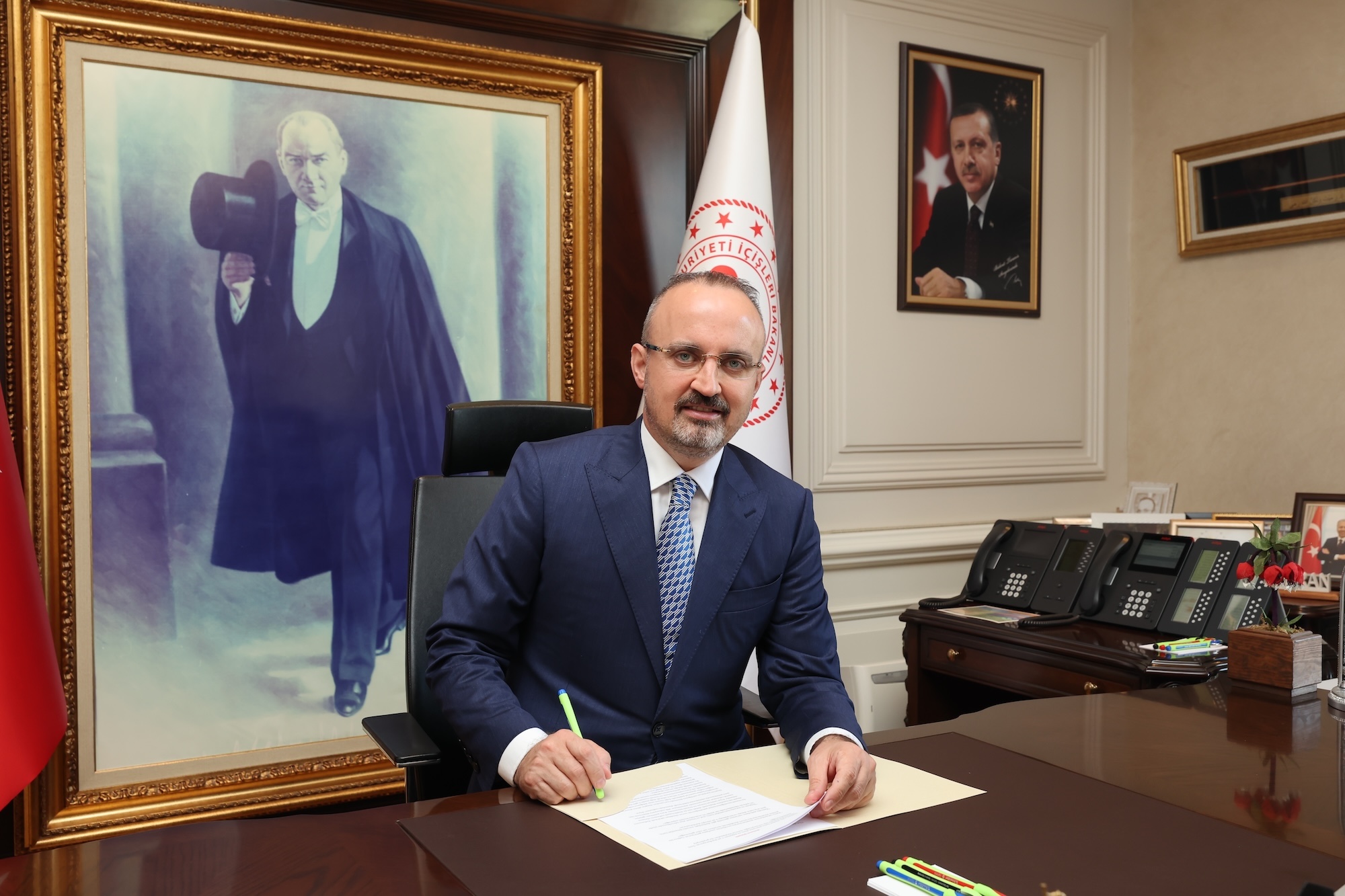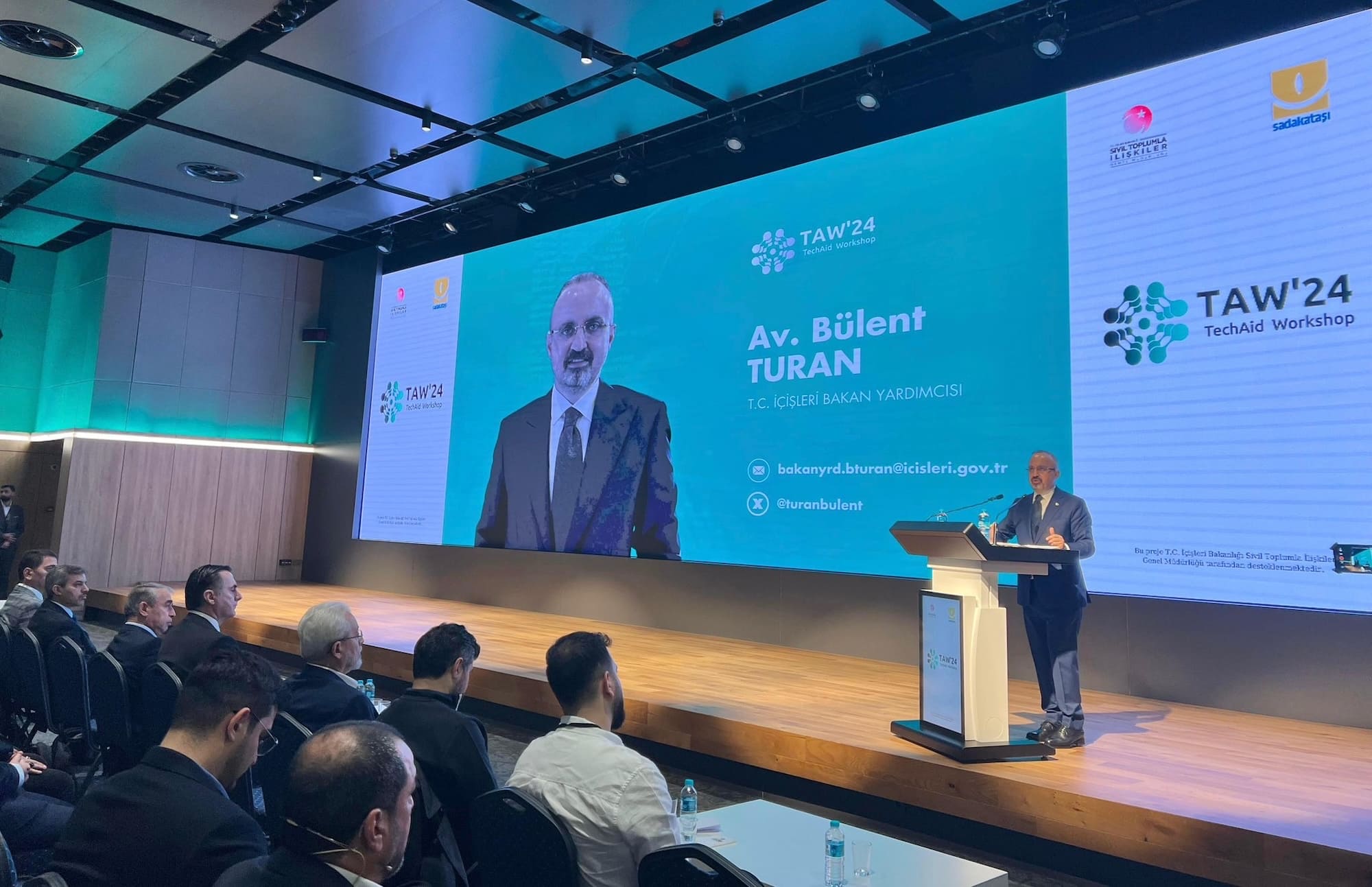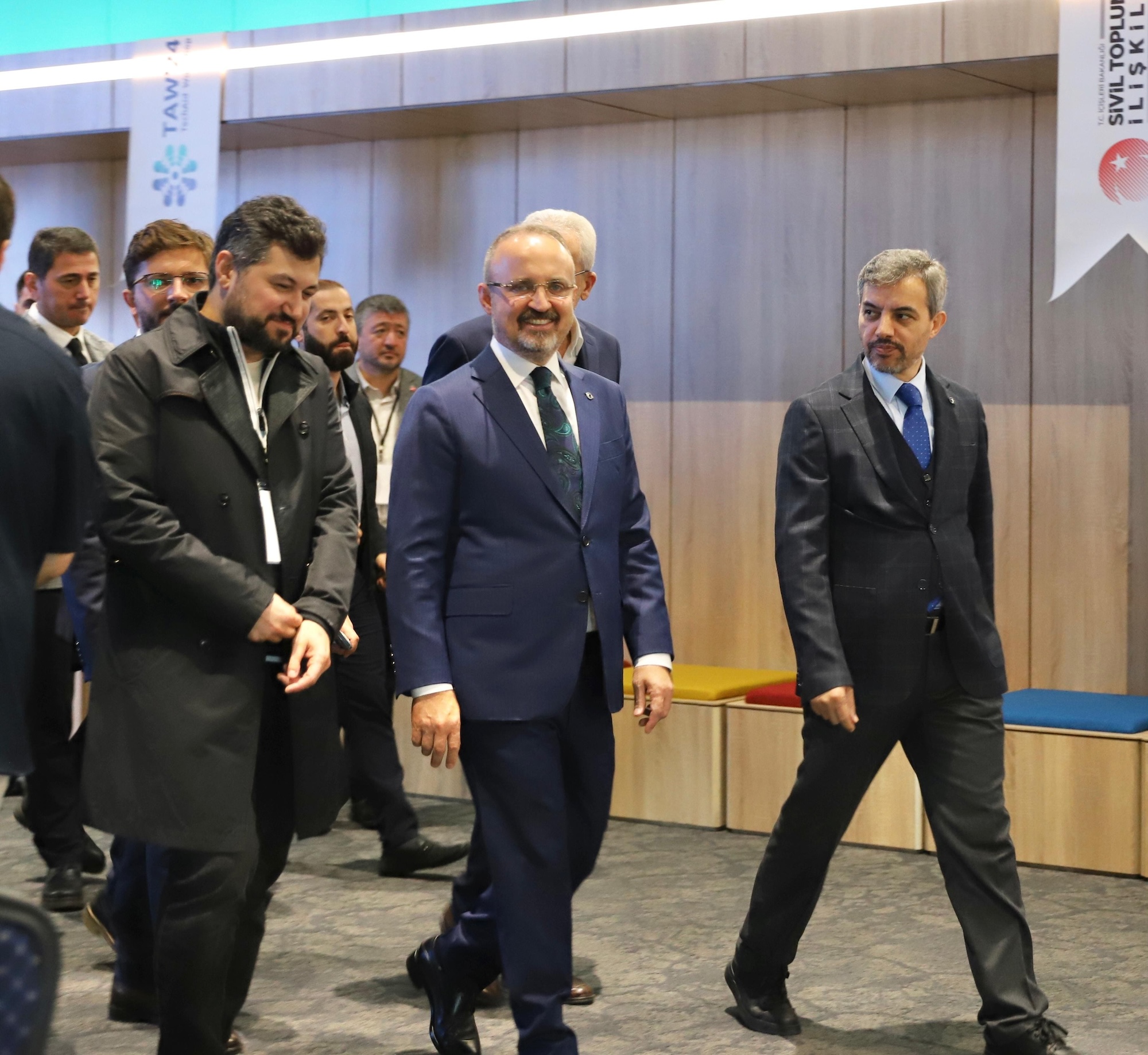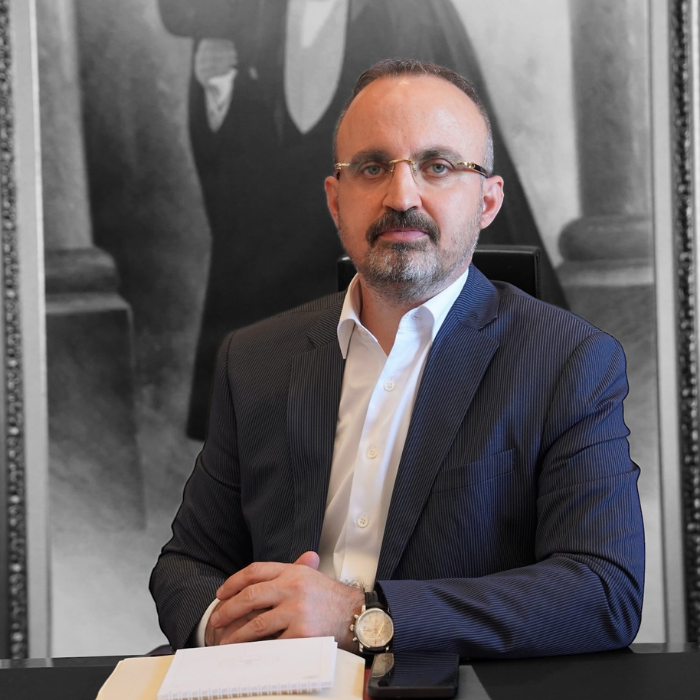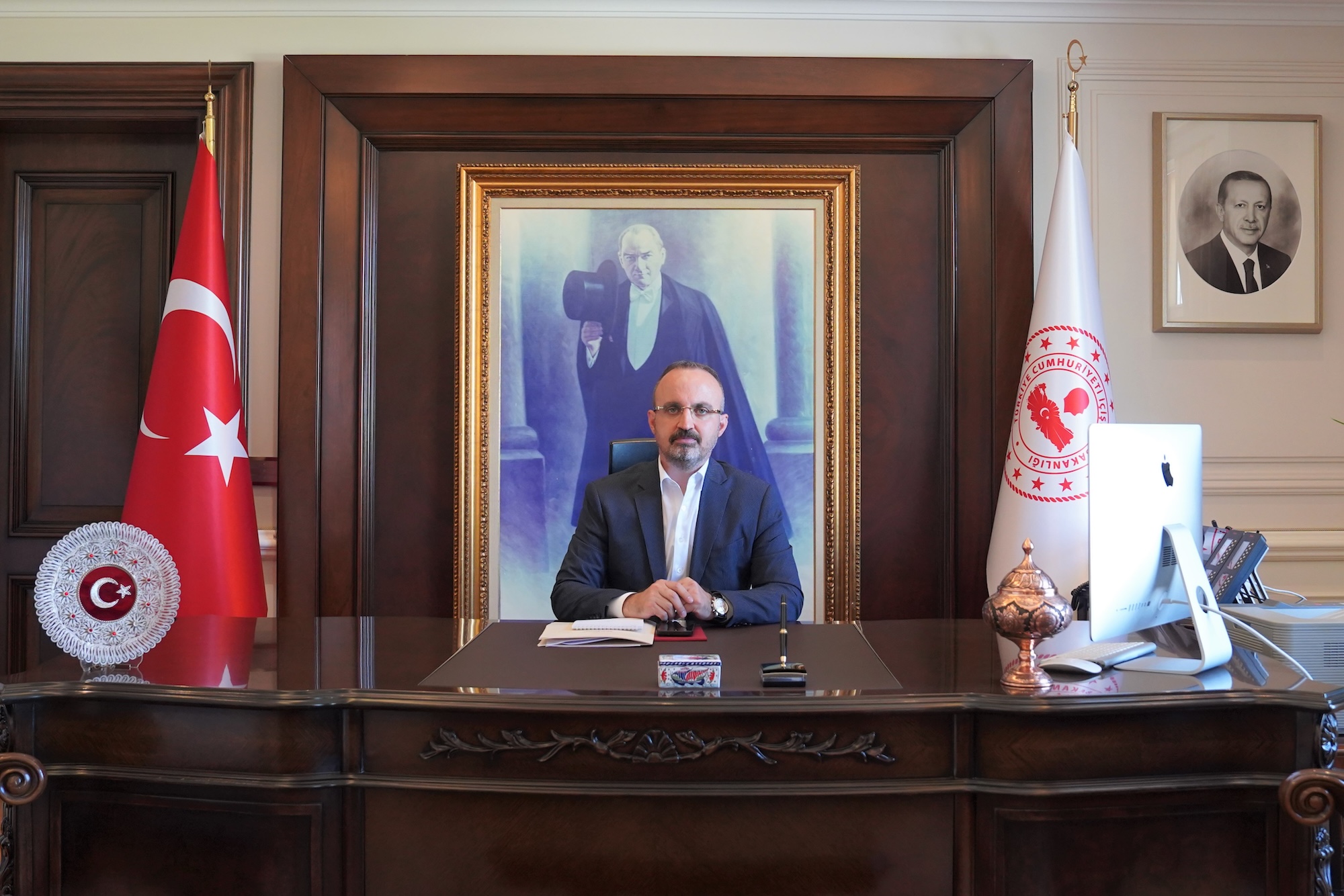

“Yes” Vote In Referendum To Elevate Turkey: AK Party’s Bülent TURAN
AK Party Group Deputy Chairman Bülent Turan said that if the constitutional amendment package is passed by referendum, a president coming to power with more than 50 percent of the vote can govern with a people-centered management philosophy, free from the pressures of pro-tutelage and pro-coup groups
AK Party Group Deputy Chairman Bülent Turan said that the European Parliament’s decision to ban the distribution of Daily Sabah should be considered together with the hostile attitudes of certain European countries toward Turkey and he stressed that the EU’s hypocrisy and anti-civilizational attitude has made Europe authoritarian, xenophobic and anti-Islamic.
Commenting on the upcoming April 16 referendum process, Bülent Turan said if the constitutional amendment package is accepted by the public, stability would become permanent for Turkey.
Turan said they sincerely believe that the presidential system will be beneficial to Turkey as a president, who came to power with more than 50 percent of the vote, can govern with a people-centered management philosophy, free from the pressures of pro-tutelage and pro-coup groups. He also added that in the presidential system, both parliamentary and executive supervision would be strengthened and the independence of the powers would be boosted, while underlining that with its acceptance, Turkey will have a stronger system with a more national outlook.
Daily Sabah: As you know last week the European Parliament decided to ban the distribution of Daily Sabah to European parliamentarians. What are your thoughts about this ban?
Bülent Turan: The European Parliament’s Daily Sabah decision is not a decision that could be considered separately [from other factors]. This decision should also be evaluated within the framework of the policies of Germany, the Netherlands, Austria and Norway towards Turkey. All Western countries adopt unwelcoming attitude towards Turkey. They do not want an independent and developing Turkey. Freedom of speech and freedom of press is ignored when Turkey is the subject; however, all the gates are opened for terrorist groups. This anti-civilizational attitude has made Europe authoritarian, xenophobic, and anti-Islamic.
DS: Also in recent weeks, a ground breaking ceremony was held in Çanakkale at your electoral district, for the “1915 Çanakkale Bridge,” which is to be one of the “mega” bridges of the world with its various features. You argue that with the approval of the presidential system, it would become easier to realize large projects and investments. Can you please further elaborate on this subject? How would the presidential system facilitate investments?
BT: Yes, the ground breaking of the “1915 Çanakkale Bridge,” which will be the world’s longest suspension bridge, took place with the attendance of Mr. President and Mr. Prime Minister. This enormous investment is of huge importance not only for Çanakkale but also for the entire Aegean region, and Anatolia, as it will ensure their integration with Europe, our main export destination. Getting back to your question, when we look at the Justice and Development Party’s (AK Party) 14-year rule, it appears that we have attained a period of economically and socially crucial stability despite all efforts aimed at destabilizing both our country and the region. And this period has turned out to be a real success story in the history of the Republic of Turkey.
Although it is a source of pride for us that these huge investments have been realized during AK Party’s rule, this may lead to the wrong conclusion that the existing government system enables such periods of stability and large investments. Actually, this success is the result of AK Party’s own success. If you remember, there had been unfinished projects in every corner of Turkey during the rule of coalition governments, projects whose foundations were laid by the previous government but not continued by the next one. Road, school and hospital projects running for decades were a fact of Turkey. The quick construction of roads, bridges and highways recently has stemmed from the AK Party’s success.
Look at this list that I’m holding in my hand, which enumerates the 65 governments in the history of the Turkish Republic. The list shows that 35 of these 65 governments lasted less than a year. How can the prime minister and ministers of a government lasting less than a year realize investments?
Therefore, AK Party’s success in recent years should not be seen as a result of the existing system. The current system, by its nature, is susceptible to crises. But AK Party’s standing its ground firmly against tutelage elites and bureaucracy has carried our nation forward. Since we are trying to make sure the gains and stability achieved during AK Party rule won’t depend on us only and stability will become permanent for Turkey, independently of persons, we believe that a presidential system is appropriate for our country.
We think that the presidential system would be beneficial to Turkey as a president coming to power with more than 50 percent of the vote can govern with a people-centered management philosophy, free from pressures of pro-tutelage and pro-coup groups.
Otherwise, the issue of constitutional amendments is not a concern solely of the AK Party. As AK Party Group Deputy Chairman, I would like to emphasize that there is no bill we cannot pass in Parliament within the existing system. But there is no guarantee that the current system will always produce a strong president and a powerful government.
Let’s suppose the AK Party leaves the scene. In this case, nobody can say with confidence that we won’t return to the fragile governments of the past that mostly lasted less than a year. If we revert to instability, our country would probably be vulnerable to crises, political deadlock, and economic contraction again. We bring before the nation the presidential system because we don’t want this bleak picture to emerge again and aim to make stability permanent in the country. And it makes us happy when we see people that acknowledge our sincerity in campaign meetings.
We believe that a ‘yes’ vote in the April 16 referendum would raise Turkey to a higher level. That’s essentially why Turkey has faced a global operation recently. For we all realize that there are a lot of foreign-based power groups that would rather see Turkey remain a weak, frail and controllable country.
DS: Presidential elections have always led to crises until today. How would the new system prevent such crises?
As you said, when you look at Turkish political history you will see that presidential elections in Parliament have always triggered crises.
From the second President İsmet İnönü onward, all the presidents of the nation had been elected amid crises. For example, following the death of Atatürk, Turkish Parliament was surrounded by troops loyal to İsmet İnönü to prevent the nomination of another presidential candidate. One of the reasons for the Sept. 12, 1980 coup was the failure to elect a president after 115 rounds of voting.
There’s no need to go that back in time. Let’s have a look at the term of the previous President Abdullah Gül who also served as president during AK Party rule. You remember demonstrators carrying signs that read, “Army, Do Your Duty,” those applauding military coups, and those who posted the April 27 e-memorandum when his nomination was announced.
We just want to put an end to this crisis-prone system with the presidential system. After the transition to the multi-party political system in 1950, we have had numerous governments, parties and constitutions. But there are certain parameters of Turkish politics that when someone tried to change them a little, party closure trials, coup attempts and military memoranda have ensued – instances when centers of tutelage stepped in.
In other words, regardless of who were nominally in power, essentially the same group has continued to pull the strings. And we just want to introduce a system in which the incumbent, provided that he/she gets more than 50 percent of the vote, serves for 5 years without making concessions to any center of tutelage, free of political turmoil.
What really matters is authority. We need to discuss to whom authority should belong to. On the other hand, those who maintain the status quo and believe that their mentality should always dominate want this system to remain in place so that they can intervene in it. There were elements in every period trying to bring into line and manipulate the political power. We argue that it’s for the people only to determine the direction of government policymaking.
DS: The main opposition leader is criticized for not reading the text of the amendments package after claiming that the new system keeps the office of the prime minister. What would you say about the issue?
The major problem in Turkey is the lack of a responsible opposition. It has become a habit to criticize anything and everything the AK Party does. Of course, there will be debates in this country. We can have a common stance at times as well. Apart from objections, there has been no concrete action on the part of the Republican People Party’s (CHP) Kemal Kılıçdaroğlu so far. I mean he has never said ‘Withdraw this text; let’s introduce such and such amendments instead.’
Trying to maintain the current system is actually a reflection of a pro-status quo mentality. Governments have changed but the CHP mentality remains the same. I wouldn’t touch upon the gaffe. Everyone has seen why the main opposition party objects to that text and how it fails to adopt a principled stance. Initially, the CHP campaign was based mostly on grave accusations like instituting a one-man rule. Recently, however, they tend to use a calmer rhetoric. Having been insistent for 15 years on not calling us, the “AK Party,” and instead preferring “AKP,” the CHP has started to call us “AK Party” lately. They have always spoken of our president disparagingly but they have begun to refer to him now as ‘Mr. President.’ In the past, they had made life a living hell for the late [Necmettin] Erbakan [leader of the Welfare Party, AK Party’s predecessor]. Today, they participate in a memorial event held in honor of Erbakan.
I think all this stems from the steady up swell of the “yes” vote. After a “yes” vote in the referendum, they would not be able to act despite people. We have not taken a step to increase or reduce the powers of the executive, legislative, or the judicial branch. There is no such thing in the text. No increase of power. We just separate the existing powers. The executive branch consisted of the prime minister and the president. We decided to eliminate this double-headedness and establish the president as the head of the executive branch.
Legislative power lies with Parliament as did before. The judicial branch keeps it powers as well.
In short, we don’t confer new powers to the executive, legislative, or the judicial branch. The existing political system is neither fish nor fowl. You cannot call it either a parliamentary or a presidential system. Laws pass only when Parliament allows. Ours is not a parliamentary system, but “a system with a parliament.” There is no increase of power, on the contrary, just the separation of power. Hence every branch will focus on its own realm and consequently, both parliamentary and executive supervision is strengthened. Independence of the powers is boosted. After appointments by Parliament, the judiciary will not be dominated by any group, any organization, or party. We will have a stronger system with a more national outlook. The executive shall derive its power directly from the people. When it secures 50 percent of the vote, the government will be formed immediately and Parliament will focus on legislation.
DS: One of the questions concerning the presidential system is what will happen after President Recep Tayyip Erdoğan. I mean how would the system work if someone with extreme views is elected president?
Brought forth by the CHP, that criticism is actually an indicator of its distrust of people. We need to trust this society. So, it’s no use discussing what will happen after Mr. Erdoğan. It’s for the people to decide.
Whomever people prefer would be the next president. Again, I want to say one more thing. I don’t think improper or grotesque candidates with extreme views can get more than 50 percent of the vote from this nation. The nation would find its new leader after Erdoğan. That’s why I don’t have any worries. Someone receiving 20 percent of the vote can represent only a certain segment of the society. But one who gets more than 50 percent of the vote has to embrace all segments of society. Indeed, leaders like Adnan Menderes, Turgut Özal and Erdoğan came to power by securing the support of all segments. We are worried because the current system has a potential to create multiple crises. We have managed to prevent potential crises in this system through the combination of a strong AK Party and strong leader Erdoğan. We want this to become a permanent state within the presidential system.
DS: But wouldn’t problems arise in the new system when Parliament is controlled a party other than the president’s one? Wouldn’t the system come to a deadlock then?
Why should it run into an impasse? What if different parties control these two branches? One is to focus on legislation and the other on execution. It may even be that such a situation will prove to be a valuable experience for us. While the president exercises executive authority, a parliament controlled by another party may establish a stronger supervision. It’s not a problem in itself. After all, haven’t we always advocated the separation of powers?
DS: But then, there are those who claim that the principle of separation of powers will be undermined when Parliament is controlled by the president’s party.
Let me ask the same question in reverse: how is it in the current system? Isn’t this government formed by AK Party, which holds the majority in Parliament? Are the ministers not AK Party deputies? What really undermines the separation of powers is the current system. But I think the separation of powers will be fully ensured within the new system. The judiciary is a separate branch anyway. Now they say that members of the Constitutional Court will be appointed by the president. Let me ask; how are they appointed presently? Does the president not appoint them in the current practice? So, there is nothing new.
Then there is that provision: A person can be elected president for 10 years (i.e., for two five-year terms) at most. On the other hand, members of the Constitutional Court are selected for 12 years. That is to say, issuing rulings favorable to the appointing president is out of the question. After being appointed by the president, court members issue their rulings in accordance with the law. Thinking they would favor the appointing president denotes distrust. On the contrary, besides ensuring clear separation of powers, the new system will also ensure the independence of the judiciary.
DS: What would you say about the claim that the new system introduces a one-man rule?
It’s impossible for someone who has to get more than 50 percent of the vote and who can be elected for two five-year terms to become a “one-man ruler.” Besides, Parliament will check the government through legislation and its supervisory powers. Can someone who has to obtain parliamentary approval for his/her budget become a “one-man ruler?” Parliament may reject the budget. What would happen when there is no compromise? They would go to the polls simultaneously.
We have worked so much on checks and balances in the new system that it’s impossible for one-man rule to emerge as alleged. In this system, respective powers of the executive and the legislative balance each other. For instance, they claim that the president may unilaterally dissolve Parliament. This is not true. The proposed amendments require the president and Parliament to go to the polls together. Dissolution is a unilateral act. But the two sides being obliged to come to the table and reach a compromise means checks and balances. This system foresees simultaneous elections.
DS: Why is the vote of confidence and motion of censure abolished?
For they are inherently instruments of the parliamentary system, in which the executive is formed from within the legislative. The legislative holds the ultimate power over the executive. In the new system, however, people would directly vote for the executive. Hence there will be no need for the approval of the legislative. The vote of confidence will be received from the people.
As you know, motion of censure is the opposite of vote of confidence. For instance, a total of 522 motions of censure have been tabled so far in Parliament but only four of them were passed. Actually, it’s not a supervisory instrument. The Motherland Party (ANAP) came to power with 32 percent of the vote and received the vote of confidence. The AK Party came to power with 36 percent of the vote and received the vote of confidence. Which is greater support: 32 percent or 36 percent? Or at least 50 percent of the vote secured by a government in the presidential system? It’s up to the people now whether or not to give their vote of confidence.
The main opposition party considers increasing the number of deputies from 550 to 600 as a waste of resources. What do you say about that?
Increasing the number of deputies would ensure greater representation of the national will in Parliament. Looking at European countries, we see that there is one deputy per 50 thousand citizens. But the same figure for Turkey stands at around 104 thousand citizens.
In Turkey, the opposition seems to be doing the exact opposite of what the AK Party says. Kılıçdaroğlu has said that even 550 deputies are too many. However, the number of deputies was raised from 450 to 550 in 1995, by a coalition government of the True Path Party (DYP) and the CHP. It was the CHP itself that raised the number from 450 to 550. I don’t know if he is not aware of this or he made the gaffe on purpose. It was the party of Kılıçdaroğlu, who just said 550 deputies are far too many, that raised the number of deputies to 550 around 22 years ago. We did not make this decision for no reason. Taking into consideration international committees, a growing population and joint initiatives with the European Union, we have decided to raise the number of deputies to 600.
Besides, this is not the old Turkey anymore. Adding 50 more seats to Parliament cannot be regarded as waste. If this is waste, then Kılıçdaroğlu should pay the TL 1.2 million ($330,000) phone bill racked up by one of his deputies. Ignoring the phone bill while criticizing the addition of 50 seats to Parliament is an improper approach.
DS: Lowering the age of candidacy for Parliament to 18 is also under criticism. How do you view this criticism?
First of all, we do not talk about 18-year-olds but those in the age group of 18-25. When you empower 18-year-olds, it is erroneously perceived as handing over the power to children. Currently we allow a 22-year-old person to become a district governor, judge, or prosecutor. Portraying deputyship as an exclusive domain is not a correct approach. I know the young people in our party’s youth branch. All of them are bright people. Did the CHP not call on youth to take the streets during Gezi Park protests? It’s ok to call on youth to take to the streets but unacceptable when you invite them to enter Parliament. This is not sincere at all. I trust our nation on this. Besides, they can only get into Parliament if they are elected by people. The age of candidacy for Parliament is 18 in developed countries like Germany, France, Britain and Spain. I don’t see why it shouldn’t be the same here. An obstacle before the youth is thus removed. Those who succeed will be able to get into Parliament.
DS: Another controversial item of the amendments package is about laws and decrees. What would you say about claims that the president will issue decrees on any matter, as though Parliament doesn’t have a legislative power?
Currently, the Council of Ministers already has the power to issue decrees that have the force of law (DHFL). There is nothing new here. Contrary to claims, we aim to limit this power and make it more democratic. In the current system, DHFLs issued by the Council of Ministers may amend existing laws. In other words, if there is a law and a subsequent DHFL on the same subject, the DHFL is superior to the law. In the new system, however, presidential decrees should be primarily about the executive realm and there shouldn’t be any law concerning the subject. Again, the president cannot issue decrees on separate matters regulated by the Constitution that are clearly set within the frameworks of the rule of law, or on fundamental political, and social rights.
Also, if Parliament issues a law on the same topic, the presidential decree shall become null and void. We talk about a narrow scope for executive legislation here. The new system doesn’t allow for repealing a law through a decree. Nor can the president involve in legislative procedures. Kılıçdaroğlu says so, but it’s not true. Parliament would maintain its legislative power. The president will be furnished with a limited version of the power currently held by the Council of Ministers.
As opposed to the current system, decrees will be subject to parliamentary and legal scrutiny. Viewed from this perspective, it is a more democratic and liberal understanding.
DS: President Erdoğan recently said that we may cancel the migrant readmission deal with the EU. However, some say that ending the deal would create the impression that Turkey is using refugees as a weapon against the EU. What is your opinion on the issue?
We view the refugee issue from the perspective of humanitarian values. Regarding the Syrian Civil War, the war in Iraq and all the other catastrophes, Turkey has always prioritized humanitarian values, opened its borders, and shared its bread and water with refugees. These problems will end one day. But in the future when people look back in history some will be ashamed and some will feel proud.
Of course, refugees are not weapons. We regard the refugees as a human rights issue. But there is one more thing. We have signed various agreements with the EU. The articles of these agreements impose some obligations on the parties. We’ve met these obligations but the EU has not. It’s just natural that we want to sit at the table and review these deals. It’s a separate discussion whether the refugees are a weapon or not, but demanding the signatory states to meet their obligations as required by the agreement and pressing them to do that is another thing.
Paylaş:

